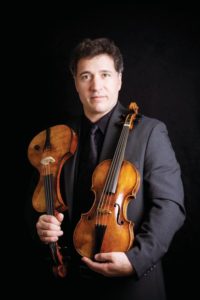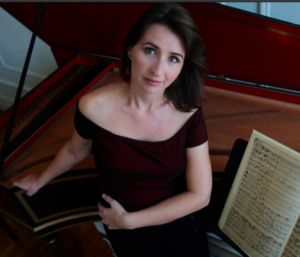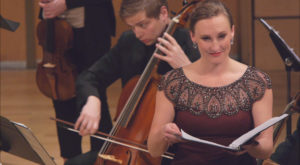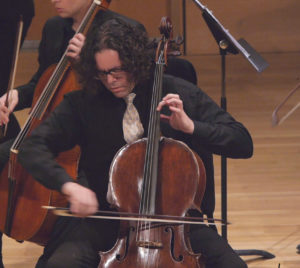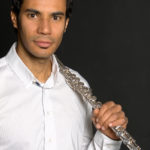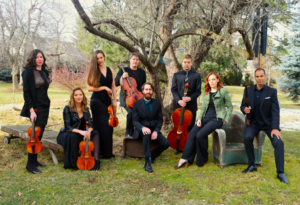Boulder Bach Festival Review: From London with Love
A Review by Gwen Gray (Photo credits from Broomfield Auditorium: Opus Zero)
Few have ever claimed that love is a singular emotion. It can be patient, blind, ill-fated, all-consuming, unrequited, sweet, tragic or true — and that’s just for starters. This was illustrated in great detail during the Boulder Bach Festival’s Feb. 14, 2019 production entitled “From London With Love,” which evoked just about every facet of love imaginable on a journey from London to Rome, with stops in fairyland and an enchanted Arthurian wood along the way.
Under the care of artistic and executive director Zachary Carrettín and guest leader and harpsichordist Nicholas Carthy (University of Colorado’s Eklund Opera musical director), the program was laced with romantic delights, bouncing from concerto to aria and back again. The liberated format speaks to BBF’s philosophy. “Authenticity…must come first. How do we want to do this now, and why,” Carrettín says.
It was the festival’s debut in Broomfield at the Broomfield Auditorium to an enthusiastic Valentine’s Day crowd. Carrettín himself welcomed the patrons and played among the string ensemble, which included Jubal Fulks, Magee Capsouto, Brune Macary, Jennifer Diaz Spera, Tom Yaron, Renée Hemsing, Joseph Howe and Brett Armstrong. The exceptional Ysmael Reyes joined on flute.
Each of the artists among BBF’s string ensemble performed on historical instruments strung with goat- or sheep-gut strings and played on 17th– and 18th-century bows. The effect was a softer, rounder dynamic, in which the instruments seemed to audibly exhale and inhale throughout the performance as the strings and bows resonated, particularly in the lower registers.
The evening’s debut was Henry Purcell’s Abdelazer Suite. It was one of Purcell’s last works, an incidental score made in 1695 to accompany a play written by the accomplished female playwright Aphra Behn’s. Her “Abdelazer,” also called “The Moors Revenge,” is a story full of intrigue, romance and murder, and the first halting, slightly menacing measures of the Rondeau communicated as much, then quickly resolved into a pleasant trot.
It was a particular joy of the evening’s program to relish several arias in no need of translation for English speakers, including soprano Szilvia Schranz’s heart-rending rendition of Oh Let Me Weep from Purcell’s “The Fairy Queen,” an adaptation of Shakespeare’s “A Midsummer Night’s Dream,” here interjected into the Abdelzaer Suite:
O let me forever weep!
My eyes no more shall welcome sleep:
I’ll hide me from the sight of day,
and sigh my soul away.
He’s gone, his loss deplore;
and I shall never see him more.
O let me weep! forever weep!
A clever inclusion of the more sensually romantic If Music Be the Food of Love — another Valentine’s Day nod to Shakespeare, but in the first line of the composition only — followed the “Abdelazer” minuet and airs, allowing Schranz’s full, songbird range to fill the auditorium.
The night’s third aria, Dry Those Eyes, which is attributed to Purcell but with some question to its ownership, was sung by mezzo-soprano Claire McCahan, a BBF vocal fellow who made her debut this evening. McCahan’s rich, warm voice was perfect for a cold winter evening’s performance and left the audience audibly gasping at the piece’s unfortunate brevity.
Not to worry, as we were later entranced by Two Daughters of This Aged Stream, a siren scene from Purcell’s semi-opera “King Arthur,” cunningly chanted by McCahan and Schranz together.
Come, come, come, come
Stay with us an hour or two.
Another highlight of the evening was Antonio Vivaldi’s splendid Concerto for Cello in A Minor (RV 418), featuring soloist Guy Fishman’s wild fingering and lightning-like bowing to the cheers of the audience. In the work’s finale, the string ensemble and harpsichord swelled and cascaded around his solos, creating an infectious, echoing exuberance.
For their next Valentine’s Day feat, BBF managed to include an obscure composition by none other than Robert Valentine, an English composer who spent most of his adult life Rome (where he became the more dashing-sounding Roberto Valentino). His Concerto Grosso in A Major was resurrected from an archive at Uppsala University in Sweden. But not without challenge. Nicholas Carthy, who worked to assemble the out-of-sequence “jigsaw puzzle” back together in playable form, found the cello part had an extra measure to be reconciled. Yet it all came together in a performance that was, in Carthy’s words, “certainly the first in the U.S., certainly the first in modern times, and possibly the first ever.” With a low, constant cello burning beneath the playful and romantic violin melodies, it made for a fascinating and welcome addition to the program.
After a charismatic solo harpsichord improvisation by Nicholas Carthy, a fitting finale was made with Handel’s Concerto Grosso in F Major, No. 2, HWV 320. Described aptly as “total heaven” by Carthy, the rhythmic opening andante larghetto simply flowed with rich harmonies, with Carrettín noticeably enjoying the music, gracefully swaying and bringing the best out of his violin.
In lieu of the Concerto Grosso’s third movement, Claire McCahan returned to sing Ombra mai fú, from Handel’s 1738 opera “Xerxes.” It was the only Italian text on the program and is sung from the point of view of Xerxes while simply admiring the shade of a beautiful tree.
In translation:
Never was a shade
of any plant
dearer and more lovely,
or more sweet.
What can audiences expect as a follow-up to this masterfully assembled program? There will be a revival of the much-lauded collaboration with 3rd Law Dance/Theater, “Obstinate Pearl,” April 5-7, 2019 at Boulder’s Dairy Arts Center. And on May 23, 2019, the festival’s season finale will include Chopin and Haydn orchestral works on original instruments, with seven guest artists joining the Festival Chamber Orchestra: principal instrumentalists of the Smithsonian Chamber Players, Philharmonia Baroque Orchestra and Händel+Haydn Society Orchestra. Such an assemblage of period players, Carrettín points out, has rarely happened anywhere outside of Boston or San Francisco.
Boulder Bach Festival’s 39th and 40th seasons are already well on Carrettín’s radar, as well. He says, “The BBF artists are constantly exploring period practices, modern practicalities, and imaginative approaches to reliving our first profound experiences in sound so that the music remains fresh, as if the ink is still wet. After all, the notation isn’t the music!”

